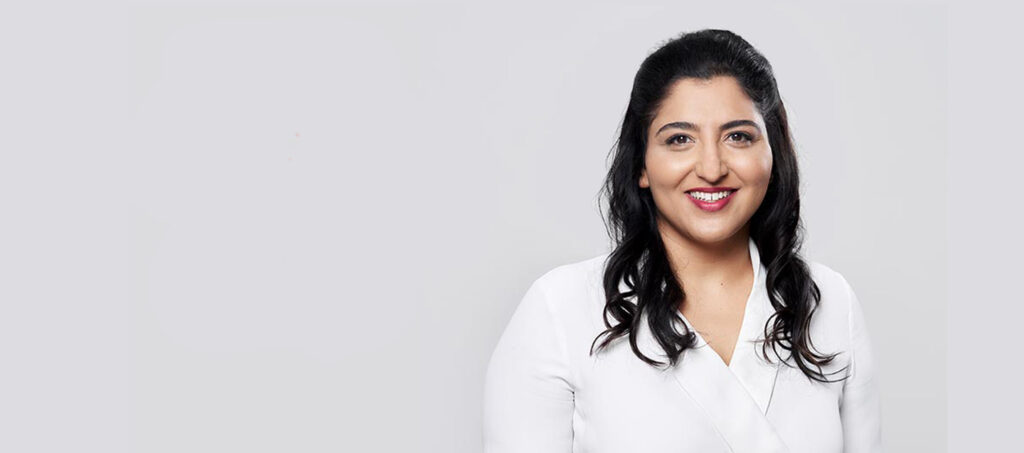RKM 740 is a trailblazing interdisciplinary specialist clinic. As a future-oriented specialist clinic, we are fully committed to salutogenesis: the holistic care of our patients. What does that mean in concrete terms? And how do patients benefit from it? In the interview, Dr. med. Schamim Schahab, head of the specialist practice for cardiology, angiology and hemostaseology answered these questions.
How exactly does the RKM 740 Interdisciplinary Specialist Clinic differ from established practices in Düsseldorf?
“What’s critical, of course, is our conceptual approach. Our concept is based on salutogenesis: caring for patients in a holistic way. Salutogenesis starts with the premise that there are many factors that are critical to maintaining health, and that dynamic interactions take place. It is precisely this concept that our specialist clinic can address perfectly; the clinic houses an array of superbly trained surgical and conservative specialist practitioners under one roof. While each practice is fundamentally autonomous, we are in close, professional contact with each other. We do restore patients to health, naturally. But we’d far rather be successful in preserving their long-term health. And we do that not just at the highest level of medical care, but also in an extraordinary setting, and, unlike other private clinics, we’re completely owner-operated.”
So the focus is on maintaining health. Operations should be performed only if they are truly unavoidable. How do you put this concept into practice?
“I can answer that using my specialist practice in cardiology, angiology and haemostaseology as an example. In the practice, I treat patients in a purely conservative manner and make all decisions based on their personal needs. I do that drawing on state-of-the-art medical technology. To decide whether cardiac catheterisation is really warranted, my first preference is to perform stress echocardiography or possibly even stress MRI. The same applies to catheterisation of the arteries of the leg; here, too, I would make my decision based on an ultrasound scan and an MR angiogram. Likewise for venous surgery, where we can precisely assess in advance whether the procedure is necessary at all. At our clinic, we focus on maintaining health; we provide patients with a comprehensive range of preventive services: our goal is to detect preliminary stages and identify risks, so we can avoid performing an intervention.”
On a day-to-day basis, what does interdisciplinary collaboration between specialist practices look like? How do patients benefit?
“Patients benefit, above all, from the very short distances, from our ability to exchange information very rapidly between individual specialist practices. Even though every practice is autonomous, we work closely together, meaning no information is lost. And naturally, we also coordinate appointments among ourselves. If one practice refers a patient to another and stresses the need that they be seen quickly, we’ll make that happen.”
Apart from the specialist dental practice, which will be licensed to serve SHI patients, the other practices are, for the time being, private practices. How do you handle enquiries from SHI patients?
“Fundamentally, SHI patients are every bit as welcome as private patients, of course. Prior to every treatment we provide a cost estimate so as to avoid unpleasant surprises. In addition, some of our practices also offer services or treatments that are fully or partially covered by statutory health insurance. What’s important is to simply ask, if you’re unsure.”
The clinic’s setting is premium, but also very intimate and friendly. In your experience, how important is the setting for long-term success?
“It’s incredibly important. Creating a positive atmosphere in which staff and patients feel at ease can even accelerate recovery times. That’s backed up by scientific evidence, for example when it comes to wound healing after operations. Likewise, it has a positive effect on blood pressure and cardiac function, which are my areas of expertise. Patients who feel comfortable in a practice are more likely to return, to attend check-ups and to engage in preventive measures. A pleasant environment, then, can contribute to preventing illnesses and complications.”
The clinic launched with nine specialist practices. Which other services are likely to be added in the coming weeks and months?
“Right now, the radiology practice is moving in, and a physiotherapy practice will also soon follow. The intention is for further surgical and non-surgical disciplines to join us, for example gynaecology or even pneumology. In the field of prevention, we’re currently drawing up plans to form medically supervised sports groups, in particular for cardiac and vascular patients. We’ve only just started. It’s really a fantastic project that will make a big difference for patients in the Düsseldorf region.”

